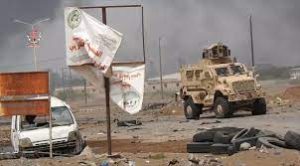 By Staff Writer
By Staff Writer
29:12:2021
On Monday, UAE backed Al Amaliqa forces took control over most of the oil-rich Shabwa province due to the removal of the province’s governor, Mohammed Saleh bin Adyo. Bin Adyo, a staunch critic of the UAE, had since November 2018 been involved in pushing out the UAE backed separatists from most of the province, which neighbour’s Aden. His removal on Saturday, and replacement with the pro-separatist Awad Al Awlaqi, had seen UAE troops capture the province uncontested, with Bin Adyo’s troops handing over control.
The Al Amaliqa had stated that their entry was aimed at liberating the Houthis province, different from previous claims that pro-government troops were supporters of the Brotherhood and Qatar. This is significant as it indicates how the UAE and Southern Transitional Council have moved forward after the thaw in relations between Saudi Arabia and Qatar, even though it is more likely that the UAE’s hatred for the participatory Islamists components of bin Adyo’s supporters was the main reason influencing the takeover -Al Amaliqa have not entered the areas of Ain and Bayhan, which are controlled by the Houthi, and which bin Adyo had been confronting. Riyadh’s silence indicates that it holds minimal sway over the UAE backed forces in the country and that it once again is acting in a manner that contradicts its interests in the conflict.
Pro-government supporters have decried the move, with many arguing that the country’s internationally recognised president, Abed Rabbu Mansour Hadi, was a Saudi Arabian puppet. These actions were not taken in the interest of Yemeni’s. Many, however, are weary and exhausted by the war and merely wish that the oil and liquified natural gas projects re-start, bringing much-needed revenue and jobs to the province.
Shabwa is an oil-rich province that hosts the strategic Balhaf port, which the Amaliqa continue to hold. It is necessary to fund government programs where Yemen to emerge from its devastating civil war, which the UN estimates to have been responsible for the deaths of over 370 thousand people.
Further, in the North, the Houthis continue to struggle to capture the last government stronghold of Marib, mainly due to increased Saudi air strikes. Sana’a airport was recently targeted by the Saudis but is now once again operational.
Peace talks aimed at finding a political solution have stalled, mainly since Saudi Arabia has continued to insist on Houthi disarmament. Moreover, the myriad of internal conflicts does mean that a ceasefire and solution between government and Houthi forces would only stop one facet of this multi-layered conflict.







0 Comments